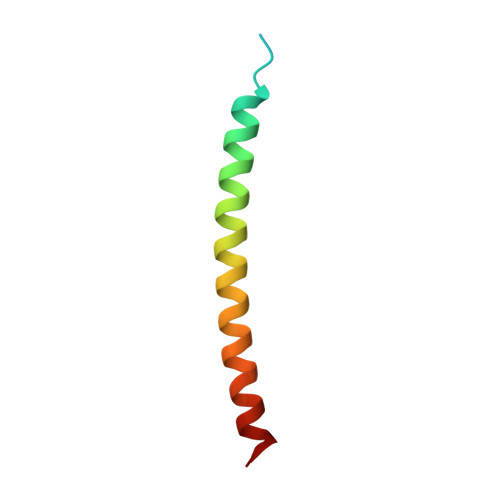Molecular and structural analysis of a mechanical transition of helices in the L. donovani coronin coiled-coil domain.
Karade, S.S., Ansari, A., Srivastava, V.K., Nayak, A.R., Pratap, J.V.(2020) Int J Biol Macromol 143: 785-796
- PubMed: 31778699
- DOI: https://doi.org/10.1016/j.ijbiomac.2019.09.138
- Primary Citation of Related Structures:
6ADO, 6ADZ, 6AH6, 6ICR - PubMed Abstract:
Protein-protein interactions of cellular importance are mediated by coiled coils (CCs), the ubiquitous structural motif formed by the association of two or more α-helices in a knobs into holes manner. Coronins, actin-associated multi-functional proteins that possess distinct cytoskeleton-dependent and independent functions, oligomerize through their C-terminal CC domain. The structure of the L. donovani coronin CC domain (LdCoroCC; PDB ID 5CX2) revealed, in addition to a novel topology and architecture, an inherent asymmetry, with one of the helices of the 4-helix bundle axially shifted (~2 turns). The structural analysis identified that steric hindrance by Ile 486, Leu 493 and Met 500 as the cause for this asymmetry. To experimentally validate this hypothesis and to better understand the sequence-structure relationship in CCs, these amino acids have been mutated (I486A, L493A, M500V and the double mutant I486A-L493A) and characterized. Thermal CD studies suggest that the I486A and M500V mutants have comparable T m values to LdCoroCC, while the other mutants have lower melting temperatures. The mutant crystal structures (I486A, M500V and the double mutant) retain the 'ade' core packing as LdcoroCC. While the M500V structure is similar to LdCoroCC, the I486A and the I486A-L493A structures show an asymmetry to symmetry transition. This study reveals crucial role of residues at position 'a' in coiled-coil domain play an important role in stabilizing the asymmetry in LdCoroCC, which might be necessary pursue specific biological function(s) inside the Leishmania.
- Molecular and Structural Biology Division, CSIR - Central Drug Research Institute, Sector 10, Jankipuram Extension, Sitapur Road, Lucknow 226031, Uttar Pradesh, India.
Organizational Affiliation:

















